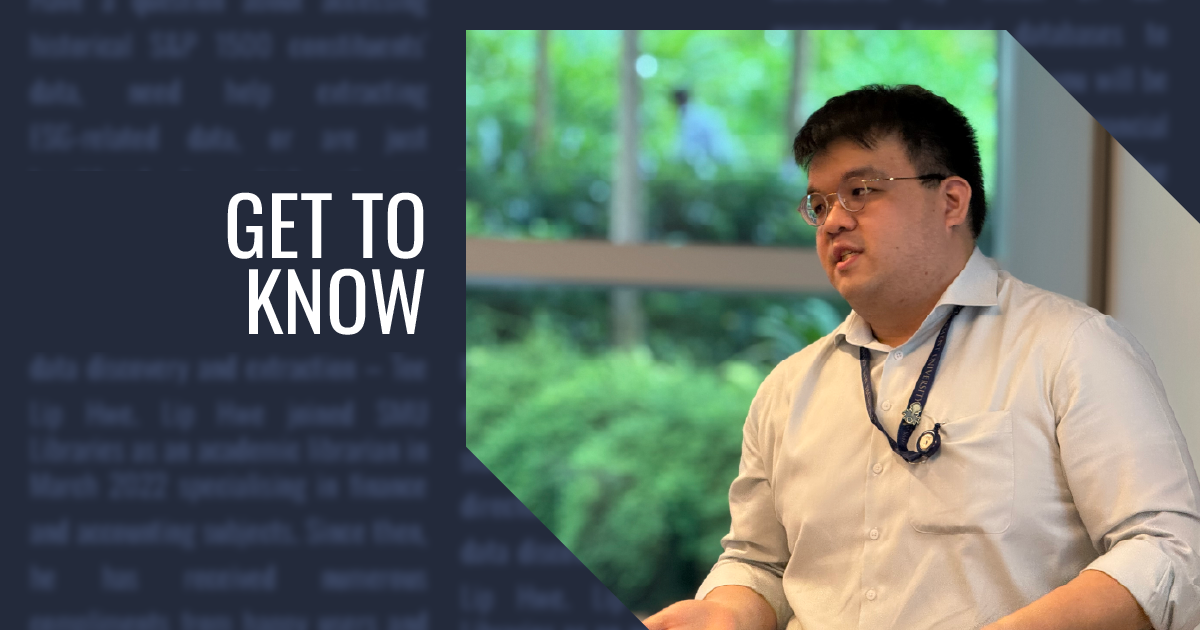
Bryan Leow joined Singapore Management University (SMU) Libraries in 2022, after having spent a significant amount of his early career in Singapore's legal industry and public service. A graduate of the National University of Singapore, Bryan, like many other students, spent a lot of time in the library stacks undertaking legal research, first as part of coursework and then as a research assistant for faculty like Professor Walter Woon S.C. After graduation, Bryan trained at a large local law firm under Singapore's pre-eminent Senior Counsel. He then moved to public service where he held several appointments including Deputy Public Prosecutor & State Counsel at the Attorney-General's Chambers as part of the then Financial and Technology Crime Division; Judicial Associate at the State Courts, and Assistant Director, Enforcement Policy and Legal at the Monetary Authority of Singapore.
Bryan also teaches as adjunct faculty at the Yong Pung How School of Law for both the law (LLB and JD) and the BSc (Computing and Law) degrees, as well as at SMU Academy for the Graduate Certificate in Law and Technology on Crimes of the Digital Economy.
Q: Hello Bryan thank you for taking the time to chat with us. Could you start by telling us a bit about your role as an academic librarian specialising in law?
Hi, thanks for making the time to interview me! That's an important question, because my ex-bosses asked if I was going to come here to shelve books. On the contrary, being an academic librarian lets me tap on my legal training and compulsion for understanding new things to support the research needs of the SMU community like faculty, students, research staff and administrative staff.
My specialisation in law means that I am better equipped to deal with questions relating to that discipline as well as consequential policy-related questions! I do often see a range of enquiries from across the University, ranging from obvious suspects (like the Yong Pung How School of Law (YPHSL))) to the non-so obvious (School of Accounting or College of Integrated Studies) -- a reflection of how the law permeates all areas of society.
I also assist in bibliometric work as part of SMU Libraries' scholarly communications support of our faculty and SMU generally. This includes handling requests for bibliometric indicators like citation counts, impact factor and author h-index, which make us very popular with the faculty during appraisal and promotion season. More importantly, we also try to keep up to date with the broader trends in the space.
Last, I also work with my colleagues to run workshops on topics like legal research and internship -- the former complements YPHSL's Legal Reasoning and Writing classes; while the latter exposes upper-year students to a broader range of tools that could be useful for their legal internships in private or public sectors, and eventually work.
Q: What are some common challenges you see researchers face with doing research in law?
The existing state of play when it comes to legal information is that a lot of it is hard to find when you only try to Google it. This in part, turns on the researcher's level of familiarity with legal terms of art, but also a reflection that the complex hierarchy in which legal materials sit within and that the interlinking connections between the various materials is not cleanly demarcated.
Where the researcher is not familiar, my consultations tend to be an overview of that particular jurisdiction's legal system and an assessment of which documents are likely relevant for their purposes (whether the question is legal in nature or not).
Where the researcher is more seasoned in legal research, I often find that the issue is one of access and coverage to the particular legal material. Here, having an excellent recollection of the available coverage within the databases (which we keep track of internally because the publishers do not tell us), and an indefatigable spirit to hunt down any publicly available sources, will come in handy. It would also be remiss of me if I did not thank our various partner libraries domestically and internationally, for helping to fill any collection gaps through provisions of interlibrary loan or document delivery.
I used to joke in practice and public service that if you give me a library and a week, I will find an answer. That rule still remains true for requests in SMU Libraries.
Q: What trends in legal research services are you most excited about, and how are you preparing to meet future needs?
Whether AI can reduce the time taken for legal research both in academia and practice! I am old (yet youngish) enough to recall being told in university that junior associates will no longer need to do much legal research because electronic databases exist. Yet even with the current AI wave, my view is that the jury is still out on that (at least for Singapore legal information).
Be that as it may, my colleagues and I are also looking at legal tech and research tools to see if there are any that might be worth experimenting on and assist our users! Some tools show great promise (and that might be a future Research Radar piece once we have it).